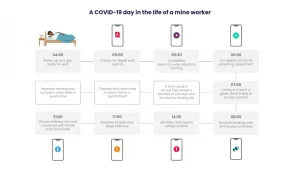The COVID-19 pandemic and nationwide lockdown has impacted all South African sectors of business, but none more so than those that rely on frontline workers, such as retail floor employees; mine workers; security staff; medical personnel; and a host of other professions that cannot work remotely.
In adapting to survive, however, the innovative solutions emerging in response to COVID-19 may ultimately prove to be a blessing in disguise for these businesses that have long struggled with the challenge of connecting an often disenfranchised frontline workforce.
This is according to Gys Kappers, CEO of Wyzetalk, who says that the COVID-19 pandemic has driven home the realisation that many of these businesses need to accelerate their workforce digitalisation. “Over the past three to four months, we have seen many businesses with frontline employees successfully embrace an entirely new way of work. Companies in the mining and retail sectors, especially, have rapidly converted functions that have always been manual, into digital processes.”
One of the examples provided by Kappers is stock taking, where the requisite reports and forms are now being completed and filed digitally. “By handling these processes digitally (even via their phones), employees are able to eliminate a lot of unnecessary physical contact. The captured data is sent directly to a central database, bypassing any physical collation of reports.”
By handling these processes digitally (even via their phones), employees are able to eliminate a lot of unnecessary physical contact.

Kappers points to the mining industry, where digital solutions have also played a key role in overcoming COVID-related challenges. “Mining companies were finding it exceedingly difficult to coordinate shifts and get employees back to work after extended quarantine, which drove them to adopt systems that can disseminate information and individualised travel permits to employees via mobile platforms.
“Employee screening also posed some challenges, with workers having to queue outside job sites while their screening and temperature data was processed. In response to this, our clients adopted screening procedures that employees could complete via a bespoke mobile platform before work each day. Data inputs then prompted further action, if necessary, once the employee arrived.
“So depending on the health information and answers provided on the mobile platform, employees were either diverted to on-site health professionals or allowed entry straight onto the premises to start work,” Kappers explains.
With that said, he notes that these digital solutions are proving to be beneficial for companies with frontline staff in myriad ways, over-and-above solving the specific COVID-19 challenges presented.
“Companies are finding that connecting frontline employees via mobile technology is also greatly improving their engagement levels. In addition to using mobile platforms to screen and provide relevant COVID-19 information, more companies are engaging with their frontline employees on a range of topics, which has produced measurable results, such as improved staff retention.”
This has a significant impact on a company’s bottom line, Kappers explains, as replacing a frontline worker generally costs roughly 20% of their salary. “A lot of time and capital is lost in finding and training replacements in any given position, so retaining employees for as long as possible is certainly beneficial, both from an economic and vital skills development perspective. And some of our clients have even reported increased employee retention rates of up to 10% after implementing digital platforms.”
With that said, Kappers adds that partnering with dedicated communications specialists is key to making digitalisation effective for a frontline workforce. “These interventions make for better companies, but only if the platforms are continually maintained and operated by dedicated teams. This is why companies should engage the services of companies that specialise in dedicated digital platforms, while they focus on their core functions.”
While the COVID-19 pandemic continues to throw curveballs at businesses with frontline workers, the result for some will be that digitalisation is steadily transforming them into the most efficient versions of themselves, he adds. “We believe that local companies that are frontline staff-centric will emerge stronger from the current economic climate if they embrace innovative digital solutions as early as possible,” Kappers concludes.
This article was published on African Mining Brief and the South African Food Review.

